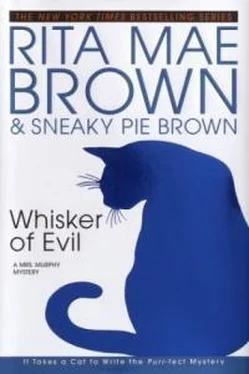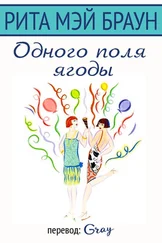The racing industry spawned bloodstock research companies, often using different criteria, which would present you with the best match for your mares. One paid for this expertise. Some people have a breeding gift; by watching horses, by reading pedigrees, they come up with good breeding matches. No amount of computer research could substitute for that “feel.”
Jerome Stoltfus, to his credit, knew that. He’d broken up enough puppy mills, saved enough mistreated horses to recognize a good animal from a sorry one. Nine times out of ten, it was the ill-bred animal that suffered.
He also knew that Tavener Heyward kept excellent records. But he wasn’t going to back down in front of Tavener. The distinguished and successful veterinarian would roll right over county officials. Jerome wasn’t going to be one of them.
“Tim’s got all the paperwork ready for you. Jerome, I’ve got to get up to Fox Glen Farm.” He reached into the open window of his truck, pulling out a leather notebook with a zipper around the outside. He unzipped it, sliding out a business card from the side flap. “Here. My cell-phone number is on there, as well as my pager. If it’s an emergency, call. If you see any equine you think might have rabies, call.”
“You think we got an epidemic?”
“I think we should all err on the side of caution.”
“Right.” Jerome squinted as Tavener hopped in his truck and drove off. Then he walked into the office.
“Mr. Stoltfus. Here you be.” Tim jovially walked out from around the desk, his arms filled with four huge manila folders closed with thin string.
“Great day.” Jerome held out his arms.
“Dr. Heyward thought you should have the records of every horse we have inoculated. The dates are clearly marked, as is the batch number of the vaccine. If, for any reason, you need a vaccine traced, we can get right back to the pharmaceutical company.”
“Right.” Jerome couldn’t think of anything else to say. He walked back out the door when Tim opened it. He placed the bulging large folders on the hood of the white county car, a Jeep, the county emblem emblazoned on the side. He opened the door to put everything on the passenger seat, already full. He decided to put the materials on the floor.
The sun glistened on the running-horse weather vane on Heyward’s stable, which shifted ever so slightly, indicating wind was coming up from the southwest.
“Hmm.” Jerome watched the arrow point of the weather vane sway back and forth gently. “Hmm.”
A wind from the southwest usually meant fierce, soaking storms.
Ramon walked out of the breeding shed.
Jerome closed the door of the car, sauntered over, and demanded to see Ramon’s green card, which the Mexican happily produced. Ramon, smart and hardworking, smiled as Jerome read the card and handed it back to him.
Without another word, Jerome Stoltfus got in the car and drove to the next farm.
Jerome, irritating and not the most intelligent man, had two things going for him. He knew he wasn’t the brightest bulb on the Christmas tree. He knew that in first grade, so he studied harder. And he retained everything he ever learned or ever saw. It would take him nights of labor to go through every single file from every barn he visited. He would write down batch numbers, he would cross-reference, he would use his computer, too. But he would make certain things were as they should be. And that was the other thing Jerome had going for him: He truly wanted to do a good job. He wanted to be the best animal-control officer in the great state of Virginia.
24

F our black-type mares in foal to four very good mid-Atlantic stallions—Fred Astaire, Corporate Report, Wayne County, and Allen’s Prospect—along with the redoubtable Binky, grazed in Harry’s upper paddock. Black-type didn’t mean the mares were black but referred to heavier black type printed on their papers, signifying graded stakes winners in their pedigrees. The more black type, the better the pedigree, on paper, anyway.
Poptart, Tomahawk, and Gin Fizz leaned over the fence, wildly curious about the newcomers.
“Pretty well-made mares.” Tomahawk judged the looks of Loopy.
“Pretty is as pretty does,” said Gin Fizz, a foxhunter admired by all who saw him in the field.
“Well, all these girls have to do is produce good foals.” Poptart winked. “Guess not Binky. She’s ancient.”
“We will,” called out Countess Cool, a 16.1-hand liver chestnut, a very eye-catching girl.
“Who are you calling ancient?” Binky snorted.
Harry and Fair sat on the fence line, watching the horses. With Paul de Silva’s help, they’d loaded the mares that represented all of Barry and Sugar’s worldly investments. The cost of the mares plus the stud fees totaled $62,000, a modest sum by the standards of Lane’s End Farm in Lexington, Kentucky, but quite a lot for two young start-ups in Crozet, Virginia.

Paul also packed up blankets, tack, bandages, meds, and even a set of jockey silks. Since Fair and Harry worked all day and Paul’s hours could be somewhat flexible, he’d asked Big Mim if he could go over and pack up. She readily agreed and was touched that he wanted to help. She was beginning to realize that Paul was a good man as well as a good horseman.
Harry would tackle unpacking everything and finding a place for Barry and Sugar’s equipment tomorrow after work.
This evening, the fireflies darting over the creek, she sat on the fence, her arm around Fair’s waist. Emotionally worn, she said nothing, nor did he. Mrs. Murphy and Tucker sat below them. Harry wasn’t one to discuss her emotions, so the silence was natural.
Pewter’s fascination with the new mares lasted for ten minutes, and then she trooped back into the kitchen and stuck her face in a bowl of crunchies, tuna-flavored, her fave. She then curled up on the old club chair in the living room. She had to wedge next to The Decline and Fall of the Roman Empire by Edward Gibbon, Volume I, which Harry was rereading. Harry loved to read well-written history, and Gibbon’s prose filled her with awe. Pewter could not have cared less about what happened to the Romans. As far as she was concerned, it was cats that kept the empire thriving for a thousand years. Cats guarded those grain shipments from Egypt. Yes, cats were responsible for the rise of all civilizations.
Mrs. Murphy leaned next to Tucker. The two friends loved each other dearly.
The corgi said, “Think she’ll ever figure it out?”
“What happened to Mary Pat or who killed Barry?”
“No. That she belongs back with Fair.”
“Oh, that.” The tiger rubbed her left paw over her whiskers. “Humans are singularly stupid about love.”
25

T he cool damp of the dew tingled underneath Mrs. Murphy’s paws. The Big Dipper, high overhead at two in the morning, sparkled against the night sky.
The tiger cat left everyone asleep in the house. Pewter’s snoring kept her awake, but she probably would have gone outside for a brief prowl, anyway. The scent of rabbits, possums, even the steady slick trails of earthworms in their ceaseless toil beckoned her. She was, after all, a nocturnal creature who had altered her habits to work with her human.
Читать дальше














